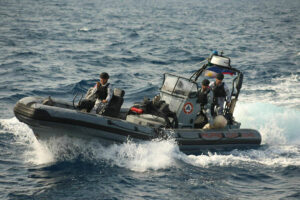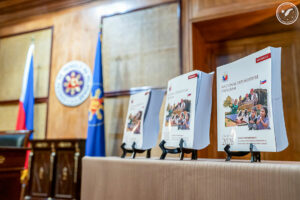At first glance, the issue of the Philippines’ victory in the Permanent Court of Arbitration (PCA) is a legal win for Filipinos alone. It was in 2016 when the arbitral court affirmed our maritime entitlements in the West Philippine Sea (WPS), invalidating China’s claim and providing us basis to reject China’s bullying acts.
Nine years later, we are still fighting despite the arbitral victory. Refusing to acknowledge the jurisdiction of the PCA, China insists that areas in the WPS — clearly part of our Exclusive Economic Zone — belong to it, and that the Philippines is illegally entering its territory.
As a result, there have been countless incidents of aggressive behavior and intimidation at sea, with our vessels, soldiers, and fisherfolk on the receiving end of China’s provocative attacks.
But today I do not wish to dwell on the present, nor belabor the point that the six years between 2016 and 2022 were practically lost in terms of asserting our victory, standing up to the Chinese, and protecting our sovereignty.
Today I would like to talk about the future amid these threats and incursions. When I said the PCA ruling was a win not only for the Philippines, I truly meant that it is a victory, albeit fragile, for every country that respects the rule of law. Moreover, it is a reminder that peace and stability are not easily attained, and that the work of safeguarding the future is difficult and enduring.
Because all this is happening in our legally established territorial backyard, it is the Philippines, amid growing challenges in the WPS, that is weaving a stronger fabric of defense built on alliances, joint efforts, and the steady modernization of our forces. What keeps us going is the real-world cooperation among us and our like-minded partners on the regional and global stage.
This is not only policy but public sentiment. A June 26-30 survey by Pulse Asia shows that 73% of Filipinos support the government’s continued assertion of maritime rights in accordance with international law, including the United Nations Convention on the Law of the Sea (UNCLOS) and the Arbitral Award. Moreover, 77% believe the Philippines must strengthen its alliances through joint defense efforts and military collaboration.
When asked which countries the Philippines should continue to cooperate with in asserting maritime rights, 73% identified the United States, followed by strong support for partnerships with Japan, Canada, and Australia.
At our Stratbase forum marking the ninth year of the arbitral award, members of the diplomatic community representing 26 countries reaffirmed their support for the Philippines.
Australian Ambassador HK Yu underscored that “Australia has shown steadfast support to the Philippines and other Southeast Asian partners in upholding international law, particularly UNCLOS, and we will continue to do so. Australia stands for rules and for a resilient region that can exercise agency, our own agency.”
Ambassador Yu further outlined, “Today, I wish to highlight the depth and breadth of our partnership to the Philippines through three key tangible ways we are helping the Philippines uphold the rules-based order. One, our long-standing defense ties and cooperation. Two, our civil maritime cooperation. And finally, cyber cooperation.”
US Ambassador MaryKay Carlson said that the US-Philippines alliance “serves as a powerful deterrent force for stability, peace, and the rule of law.” Japanese Ambassador Endo Kazuya said Japan and the Philippines are no longer just partners in principle — “we are partners in action, united by a shared commitment to a free and open Indo-Pacific and the rule of law.”
The representatives of New Zealand, France, the United Kingdom, Germany, the European Union, India, and Vietnam also expressed support for the Philippines and reiterated their commitment to peace and stability.
In the same forum, our own defense officials talked about beefing up our capabilities, reflecting survey results that show 65% of Filipinos supporting the continued modernization of the Armed Forces of the Philippines (AFP) and the Philippine Coast Guard (PCG). Meanwhile, 51% favor reinforcing alliances through joint patrols and exercises.
Ambassador Yu emphasized that Australia is committed to strengthening regional maritime security, saying, “We are, for example, working together with the Philippines and other Southeast Asian states to enhance their maritime security capabilities. Doing this is critically important for Australia. Indeed, one of the first things Prime Minister Albanese said after the recent election was strengthening our relationships in our region.”
In a similar vein, US Admiral Steve Koehler, Commander of the US Pacific Fleet, noted that “While China has ignored the Arbitral ruling, the rest of the world has not. The ruling’s rejection of China’s claim and its endorsement of the Philippines’ EEZ has become the widely accepted view.”
He cited the recent Balikatan exercises as evidence of deepening cooperation: “One of the clearest signs of allies and partners’ solidarity is the robust series of maritime joint combined exercises across the region. Those include Balikatan right here in the Philippines. With credit to our Philippine hosts, Balikatan 2025 was the largest ever, with forces from the Philippines, United States, Australia, Japan for the first time, and 16 other nations observing.”
Finally, Foreign Affairs Secretary Ma. Theresa Lazaro said: “The Philippines will not waver in firmly rejecting attempts to undermine the award and international law.”
The threats and challenges we face in the West Philippine Sea are daunting, but the support and commitment of our like-minded partners — who share our vision of a stable, secure, and rules-based regional order — emboldens us. We will continue working toward and believing in peace and stability not only in our country but in the Indo-Pacific region.
Victor Andres “Dindo” C. Manhit is the president of the Stratbase ADR Institute.






